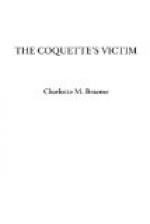Then the dearest wish of her heart was to see her son, the heir to Ulverston, marry Marion Hautville, one of the loveliest girls and wealthiest heiresses in England. She was far too wise ever to express such a wish openly, none the less it was deeply engraven on her heart. They were warmly attached to each other and Lady Carruthers fancied that she already saw some signs of liking on the part of Marion for Basil.
While Miss Hautville pursued her quiet, ordinary course of education under Lady Carruthers’ roof, Basil went through Eton and Oxford; at both places he gained high honors and at both places he succeeded in puzzling his tutors and masters. He was of such a peculiar disposition; chivalrous, romantic, brave, yet with something about him—they could not define what, but quite unlike other boys.
He did not evince any taste for any particular branch of study; he had no inclination for the navy, for serving his country as his father had done before him. In fact, it was difficult to tell in what direction his taste really lay. Still, he left college with high honors, and his masters prophesied great things for him.
“He will make himself famous some day,” they wrote to his anxious mother. “In the mean time, let him see something of the world, and you will know in what direction his talent lies.”
So, crowded with honors, he came home to Ulverston. He was eighteen then and one of the handsomest young men England could boast. No barber’s beauty; strong, comely, of noble bearing, with a face that had come to him from the crusaders of old.
Then Lady Hildegarde set herself to work to discover what manner of man her son was. She was puzzled; he was brave, generous, full of high spirits, truthful, even to bluntness. She could not discover any grave fault in him. She thanked God he had no vices, no mean faults, no contemptible failings.
“Basil,” she said to him, one evening, as the three sat around the drawing-room fire. “Confess now, do you not like and admire the olden times better than these?”
“Yes,” he replied; “I always did.”
“I knew it,” said Lady Hildegarde; “I understand now what has always puzzled everyone who has had the care of you. You were born two hundred years too late; the ancient days of knight errantry and chivalry would have suited you better than these.”
“It is your fault, mother,” he replied. “When I was only twelve years old, you gave me a beautiful edition of Froissart’s Chronicles, and everything else has seemed dull and tame to me since.”
“I thought as much,” she said, quietly; “you make the same mistake others have made before you; you live in the past, not in the present.”
“You are right, mother; in these days, there seems to me nothing to do.”
“Your father thought differently,” she said; “he died from overwork.”
“Ah! my dear father was a genius,” said the young man, thoughtfully, and for some minutes there was silence between them.




